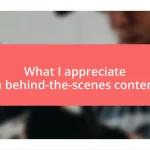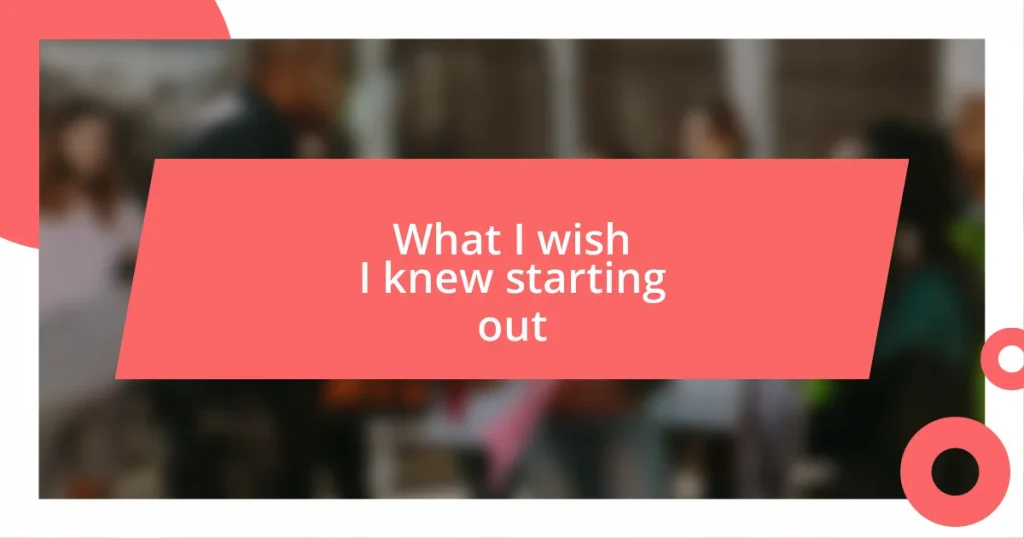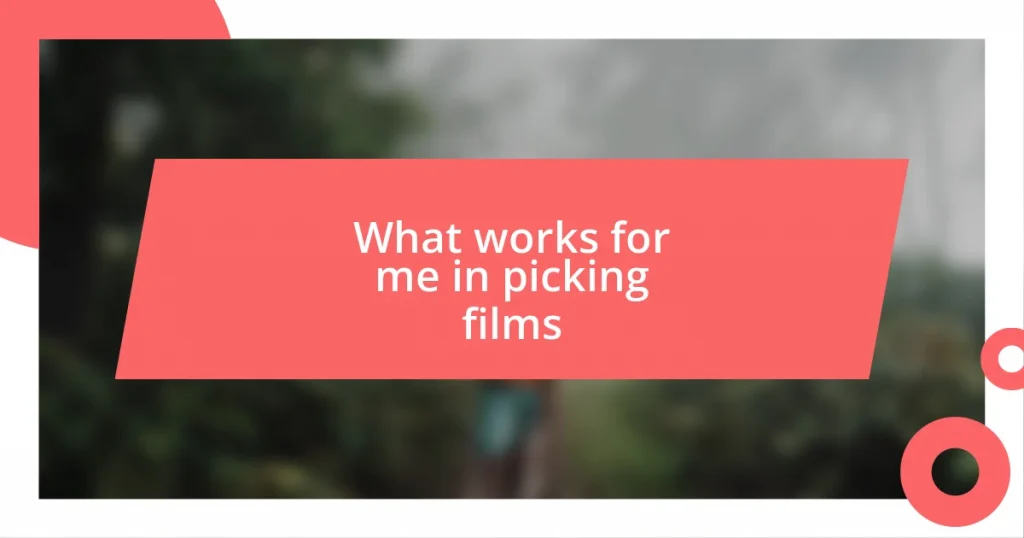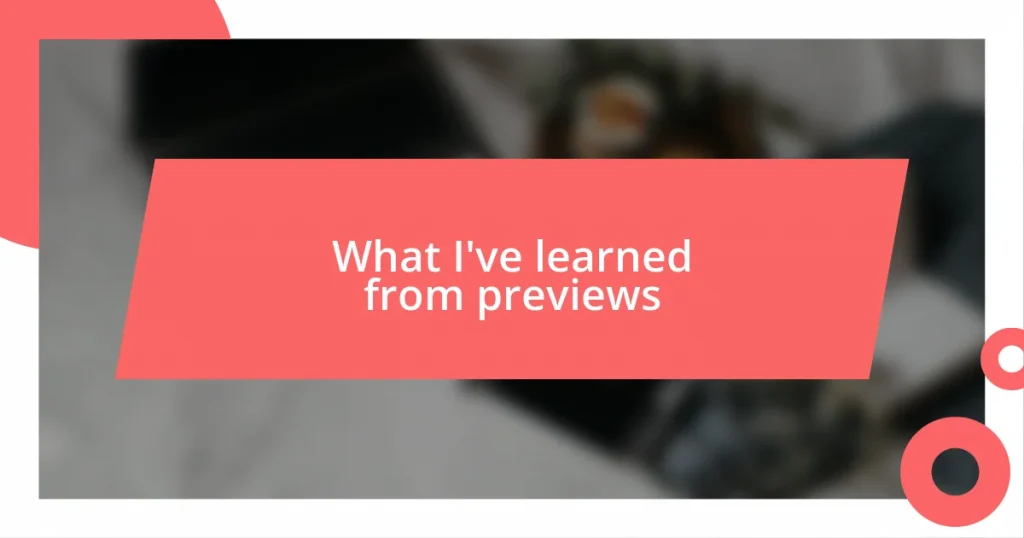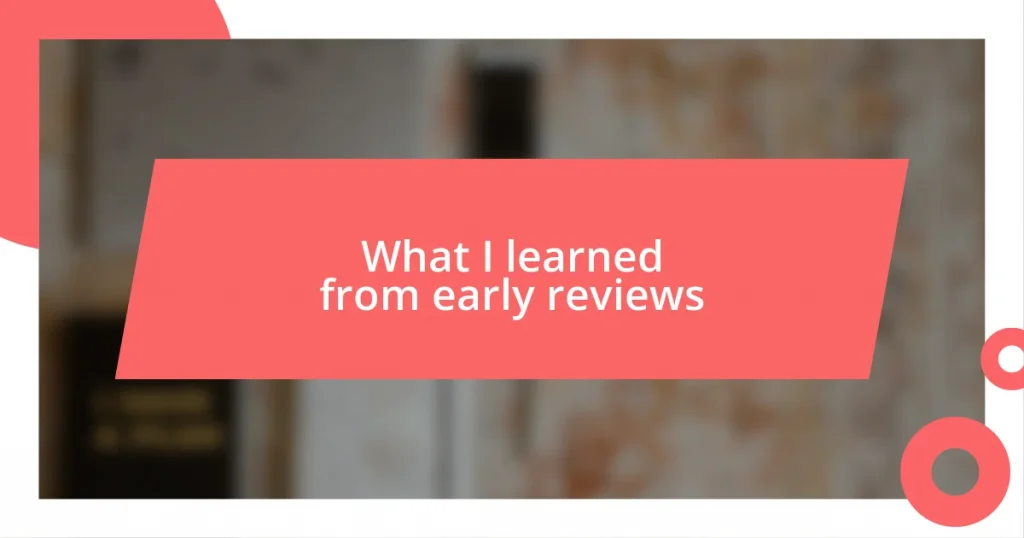Key takeaways:
- Embracing failure is essential for growth; setbacks provide valuable lessons and opportunities for improvement.
- Seeking feedback and mentorship can offer fresh perspectives and guidance, fostering personal and professional development.
- Building authentic relationships through meaningful conversations enhances networking, creating a supportive community that promotes collaboration and success.
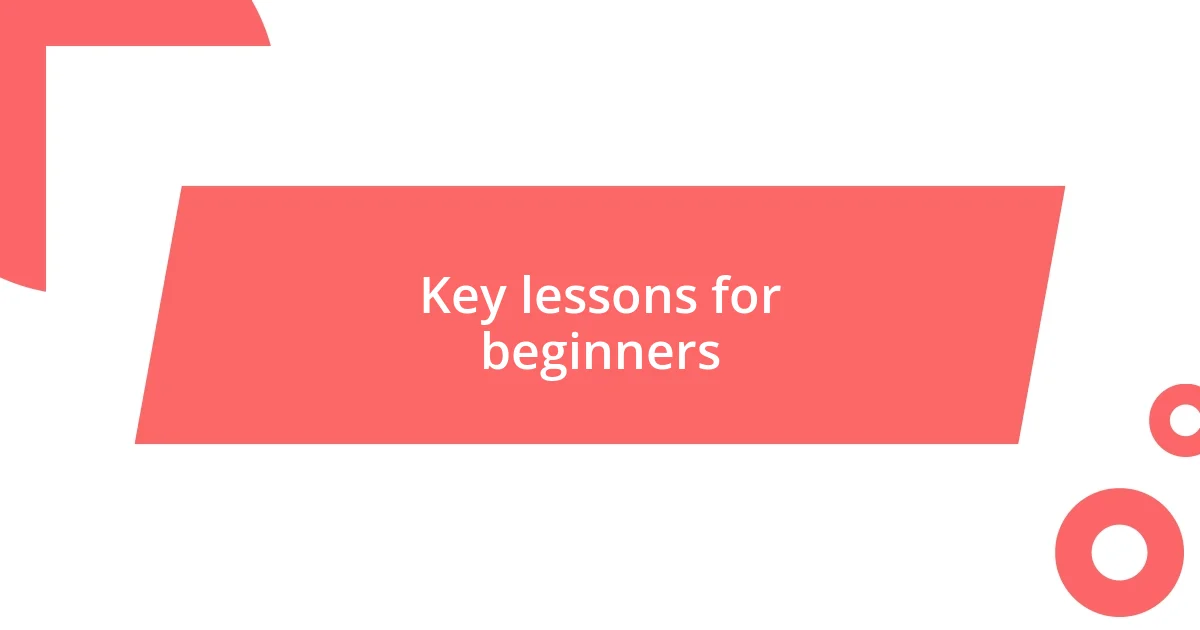
Key lessons for beginners
One of the most crucial lessons I learned early on is the importance of embracing failure. I still remember a project I poured my heart into—only to see it flop spectacularly. It was a humbling experience, but it taught me that every setback is an opportunity to learn and grow. Have you ever faced a similar moment?
Another key lesson is to seek feedback actively. I used to think that my work was a reflection of my worth, so I hesitated to ask for opinions. But when I finally did, the constructive criticism I received created breakthroughs I never expected. Isn’t it fascinating how the perspectives of others can broaden our understanding?
Lastly, time management became my ally more than ever. At first, I struggled with balancing multiple tasks, and stress often crept in. I realized that breaking tasks into smaller, manageable pieces allowed me the clarity and focus I needed. How do you prioritize your challenges? Creating a structured approach transformed my workflow into something much more effective and enjoyable.
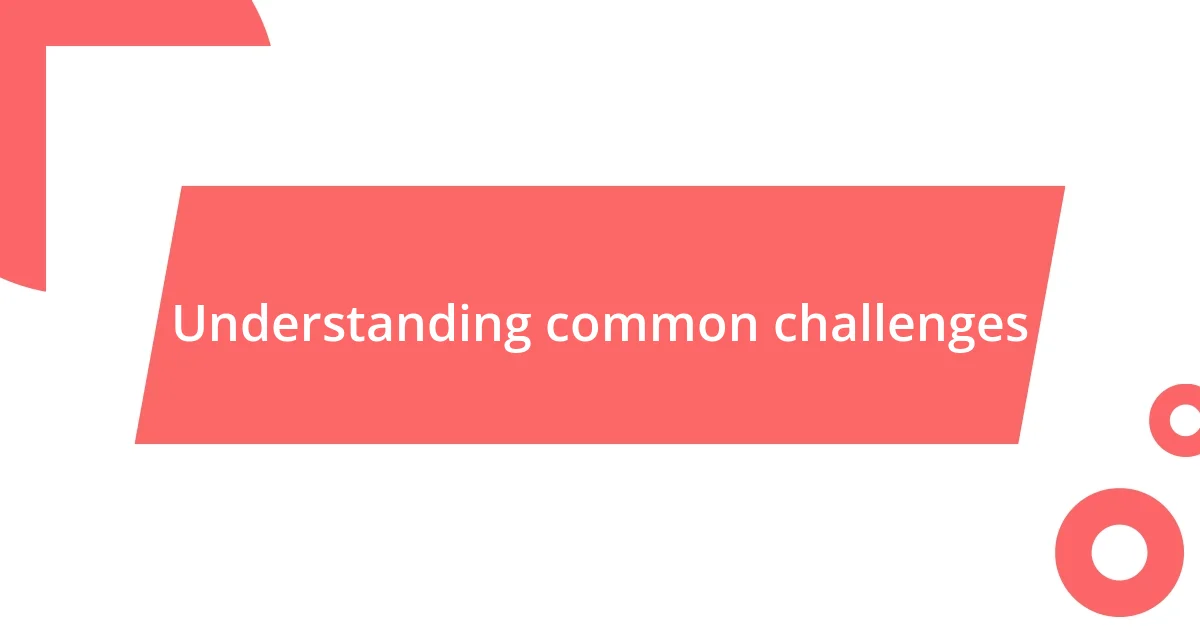
Understanding common challenges
Understanding common challenges can be a revelation, especially when they catch you off guard. I remember launching my first independent project, feeling confident about my vision. Yet, I faced unexpected hurdles—people misinterpreting my ideas or technology faltering at critical moments. These experiences made me realize that miscommunication can derail even the best intentions.
Here are some common challenges that many people encounter:
- Imposter Syndrome: Doubting your abilities can be paralyzing, even when you’re perfectly capable.
- Overwhelm from Choices: The abundance of options can lead to decision fatigue, making it hard to take the first step.
- Isolation: Working alone can feel lonely, which sometimes makes me crave feedback from others.
- Time Constraints: The pressure of deadlines can cause stress, especially when the workload feels insurmountable.
- Balancing Passion with Practicality: It’s a constant tug-of-war between what I love to do and what pays the bills.
Recognizing these challenges can make the road ahead feel less daunting. In my case, acknowledging my feelings of isolation motivated me to reach out to peers, leading to connections that became invaluable both personally and professionally.
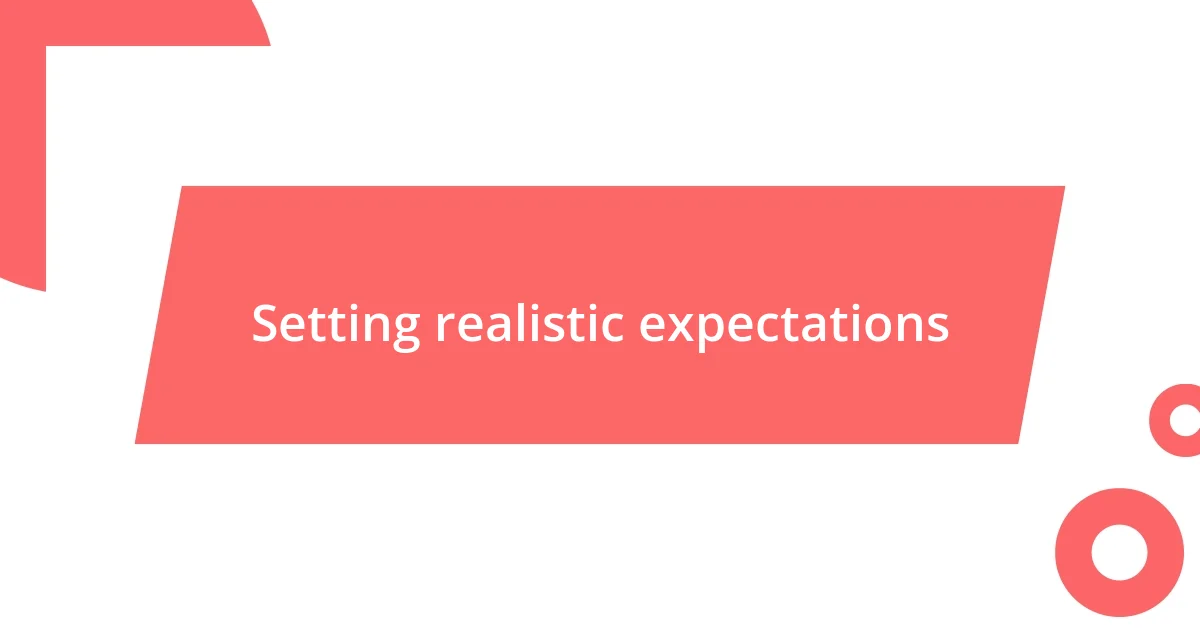
Setting realistic expectations
Setting realistic expectations can make all the difference when you’re just starting out. I remember my first week on a new project; I aimed for perfection and ended up feeling overwhelmed. It took time for me to understand that striving for excellence is important, but so is allowing room for mistakes and adjustments. Have you ever felt crushed by high expectations? That realization shifted my focus to measurable goals, which helped reduce anxiety and boost my confidence.
As I navigated various ventures, I found it vital to communicate my goals with others. Early on, I would often keep my expectations to myself, resulting in misalignments that could have been avoided. By sharing my vision and progress with teammates and mentors, I learned that collaboration leads to more realistic outcomes. When we align our expectations with others, we cultivate a sense of shared purpose and understanding.
Maintaining a balanced perspective also plays a significant role in setting realistic expectations. I’ve experienced moments where I’ve seen others thrive and felt tempted to compare my journey to theirs. However, I learned to embrace my unique path. What may seem like clear-cut success for others can mask the struggles they faced behind the scenes. I now remind myself that everyone’s timeline is different, and that has been incredibly freeing for my mindset.
| Expectation | |
|---|---|
| Reality | What I Learned |
| Instant success | Growth takes time and patience. |
| Flawless execution | Embrace imperfections; they are stepping stones. |
| Consistent motivation | It’s okay to have off days; bounce back is key. |
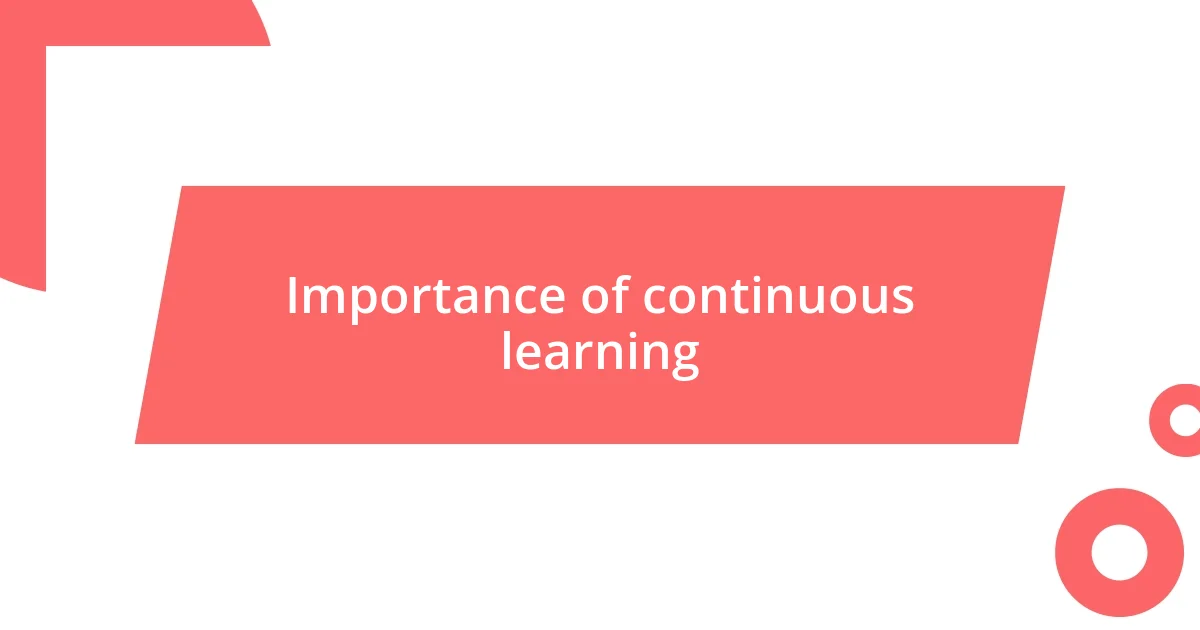
Importance of continuous learning
Continuous learning is crucial in a rapidly changing world. Reflecting on my journey, I remember how I initially thought that gaining a degree would suffice for a lifetime of knowledge. However, I quickly found myself grappling with new technologies and ideas that emerged almost daily. Have you ever felt that rush of realization when something you learned yesterday suddenly felt outdated? That moment made it clear to me that staying curious and open to new information is essential for growth.
I recall attending a workshop early in my career that opened my eyes to the power of continuous education. Every new concept shared lit a spark in me—suddenly, I understood how isolating it can be to stick solely to what you know. The joy of learning something new not only enhances your skill set but also boosts your confidence. It’s almost like finding a secret weapon you didn’t know existed, allowing you to tackle challenges head-on.
Moreover, embracing continuous learning has enriched my personal life as well. I remember taking up a hobby just for fun and accidentally discovering a passion that changed my perspective. Have you ever pursued something only to find unexpected benefits? That experience drove home the importance of learning beyond our professional lives. It’s a reminder that every new experience, be it big or small, shapes who we are and opens us up to new possibilities.
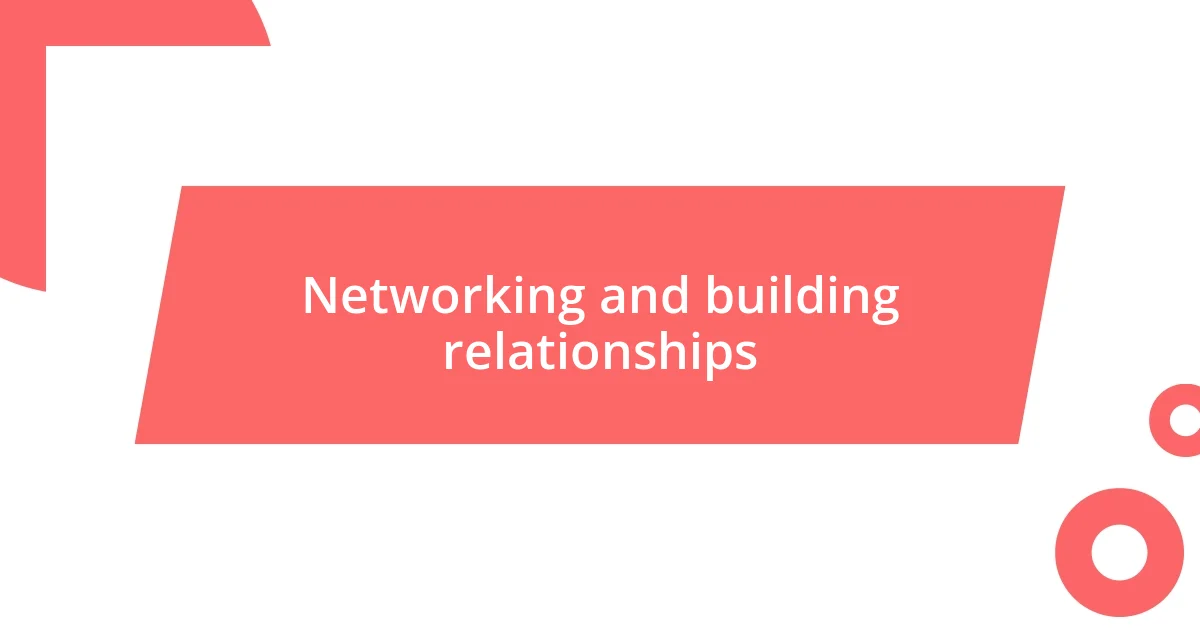
Networking and building relationships
Building authentic relationships has been one of the most rewarding aspects of my journey. Early on, I thought networking was just about handing out business cards and collecting contacts. But I soon realized that true connections come from meaningful conversations and shared experiences. Have you ever felt a spark of connection with someone during a casual chat? Those moments illustrate how relationships can blossom outside formal networking events, often leading to unexpected opportunities.
As I ventured further into my career, I made a conscious effort to nurture these relationships. I often invite colleagues to lunch or coffee, creating a relaxed environment to exchange ideas. These informal settings foster deeper conversations, allowing us to discover common interests and goals. Have you found that stepping away from the office can transform dialogue into something more genuine? I certainly have, and each coffee catch-up has opened doors I never anticipated.
Additionally, I’ve learned that reciprocation is key in any network. Whether it’s offering guidance to someone new in the field or simply being there for a friend, these acts create a support system where everyone thrives. One personal story comes to mind: I once helped a colleague refine his presentation, and in return, he shared invaluable insights on a project I was struggling with. It’s these give-and-take moments that reinforce the importance of investing time and energy into the people around us, creating a rich tapestry of support and collaboration.
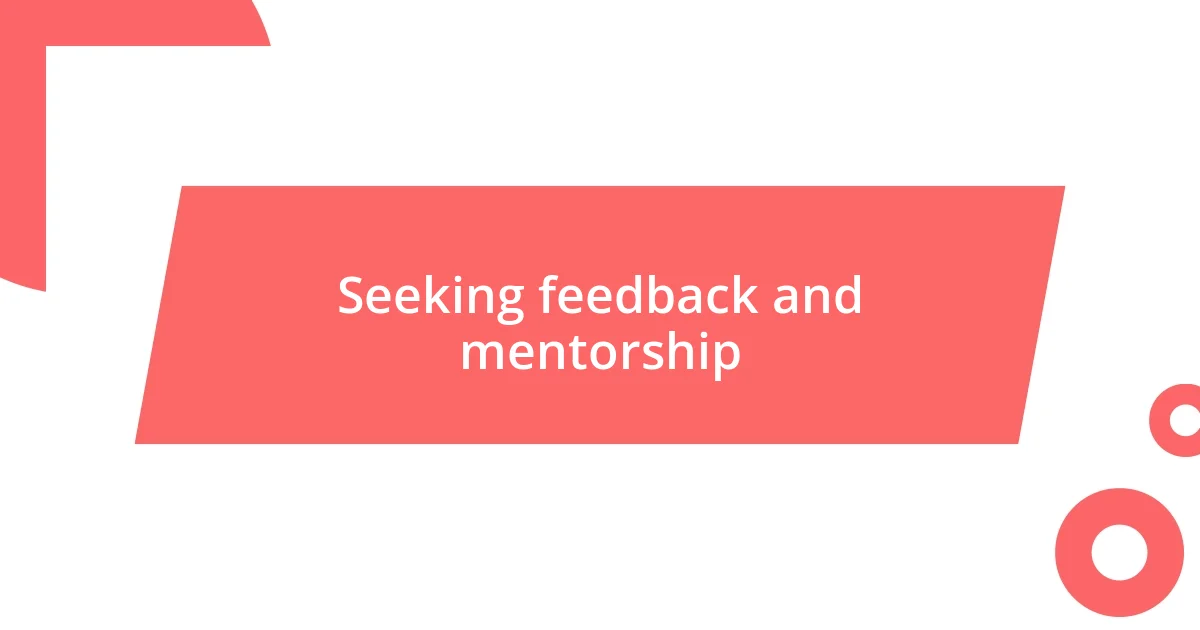
Seeking feedback and mentorship
Seeking feedback and mentorship has been a pivotal part of my growth. Early in my career, I hesitated to seek input, fearing criticism. But, when I finally mustered the courage to ask a mentor for feedback on my project, I was amazed at how much clarity and direction it provided. Have you ever felt that relief when someone offers a fresh perspective? It’s like stepping out of a fog and realizing there’s a clear path ahead.
Mentorship, in particular, became a lifeline for me. I remember the first time I reached out to someone I admired in my field. To my surprise, they graciously agreed to meet. Our conversation was a blend of wisdom and encouragement, illuminating my next steps. The questions they posed challenged my thinking, but they also gave me the confidence to embrace new opportunities. Isn’t it incredible how one conversation can shift your entire outlook?
I have come to realize that being open to feedback is essential, not just professionally but personally too. One time, I shared my work with a colleague who didn’t hold back with their insights. At first, I felt defensive, but their honesty ultimately refined my approach in ways I couldn’t have imagined. That experience taught me a valuable lesson: vulnerability in seeking input fosters growth. What would you gain if you dared to ask for feedback from those around you? Sometimes, that simple act can lead to profound transformation.
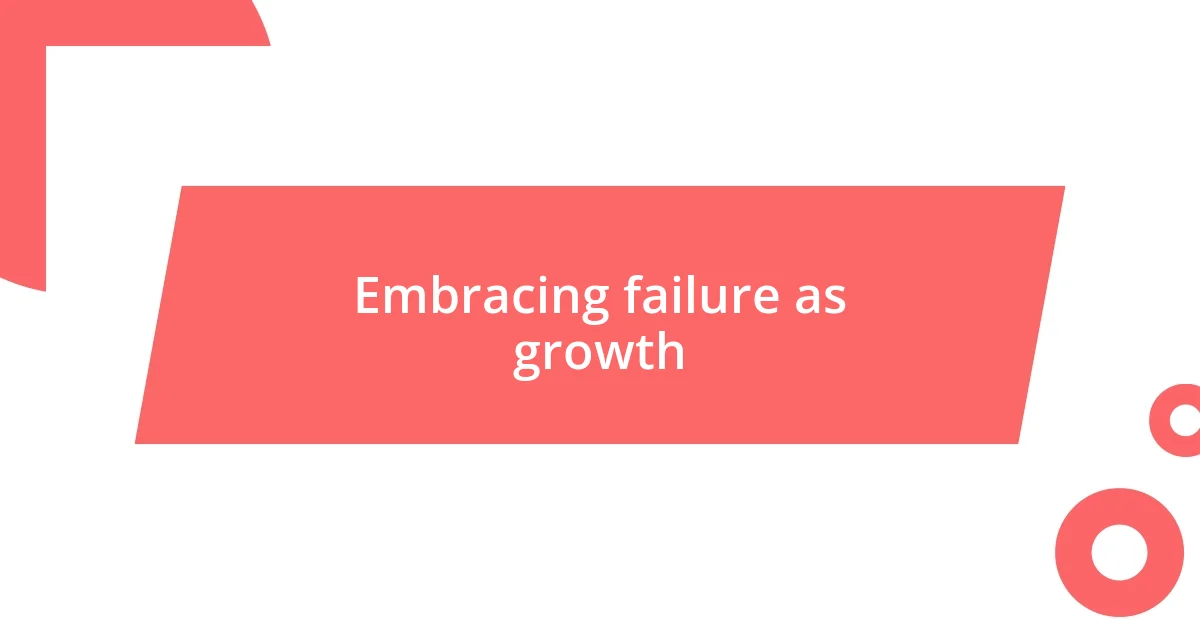
Embracing failure as growth
Embracing failure has been a cornerstone of my personal and professional development. I remember an early project that went south despite my best efforts. At first, I felt devastated and embarrassed, but in retrospect, that moment became a catalyst for my growth. I learned to dissect the experience, pinpointing what didn’t work. Have you ever analyzed a setback instead of just letting it haunt you? It’s a powerful realization.
As I moved forward, I started viewing every misstep as a lesson. There was a time when I bungled a critical presentation, missing key points that I should have nailed. Initially, I berated myself, but then I chose to reflect on what led to the confusion. Instead of hiding from the mistake, I shared my experience with peers, and they appreciated my honesty. Have you considered that sharing your failures can inspire others? This openness not only boosted my confidence but also forged stronger connections with colleagues who could relate.
I’ve also learned that failure can be an excellent teacher if you’re willing to listen. After stumbling in a leadership role, I sought feedback from my team, prompting an honest discussion about my shortcomings. I found their insights invaluable; they transformed my approach moving forward. Isn’t it incredible how much we can grow when we invite others into our experiences? Embracing failure has taught me resilience, empathy, and a deeper understanding of my own capabilities. These lessons are invaluable, and I cherish them as integral to my journey.







